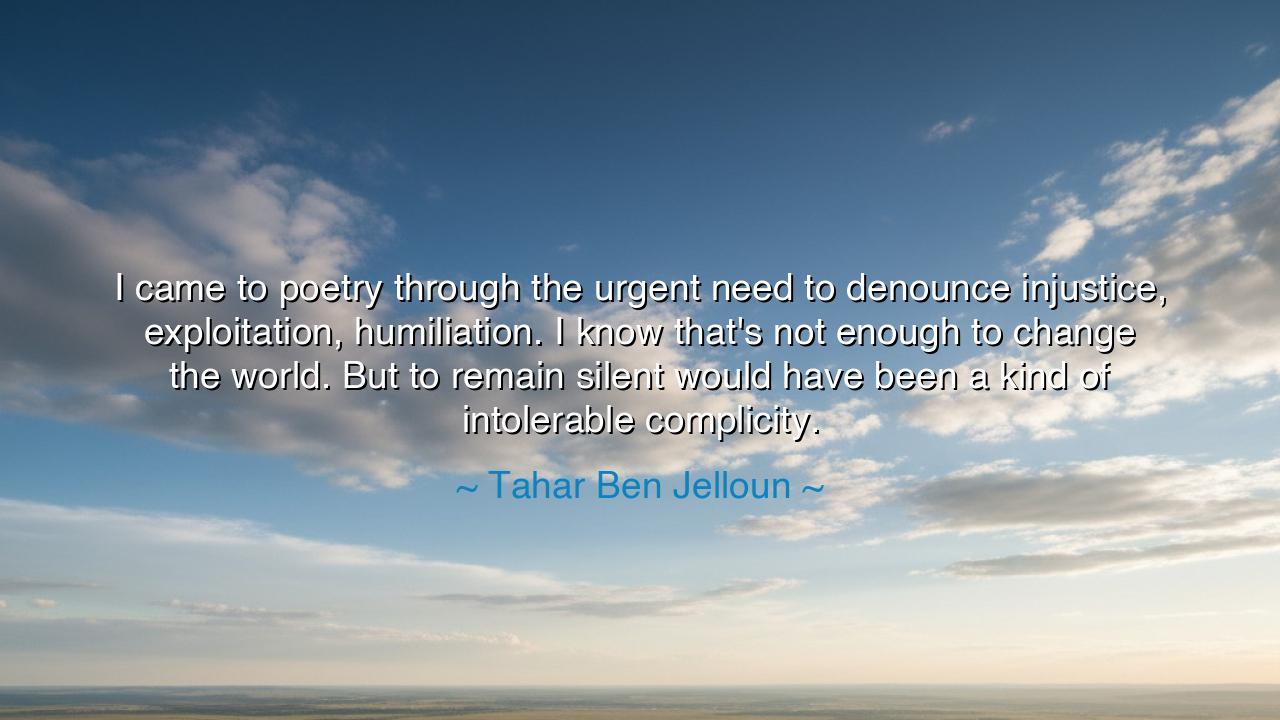
I came to poetry through the urgent need to denounce injustice
I came to poetry through the urgent need to denounce injustice, exploitation, humiliation. I know that's not enough to change the world. But to remain silent would have been a kind of intolerable complicity.






Tahar Ben Jelloun, the Moroccan poet and novelist, gave voice to the cry of the oppressed when he declared: “I came to poetry through the urgent need to denounce injustice, exploitation, humiliation. I know that's not enough to change the world. But to remain silent would have been a kind of intolerable complicity.” These words resound like the clang of a sword against the armor of tyranny. They remind us that poetry is not only beauty for beauty’s sake—it can be fire, it can be witness, it can be rebellion when silence would make the soul guilty.
The origin of this declaration is found in Ben Jelloun’s life and times. Born in Morocco and later living in France, he stood at the crossroads of cultures, witnessing both the wounds of colonial history and the struggles of those who carried its scars. He understood the injustice faced by the voiceless: the laborer stripped of dignity, the exile torn from home, the woman silenced under tradition. For him, poetry was not luxury, but necessity—the only weapon he could wield against the weight of humiliation.
Consider the story of Pablo Neruda, the Chilean poet, who also turned his verses into a weapon against oppression. Neruda’s poetry denounced poverty and tyranny, giving voice to miners, peasants, and rebels. Though his words alone could not topple dictators, they carried the pain of a people into the ears of the world. Like Ben Jelloun, he knew the limits of verse, but he also knew that silence is surrender. In their voices we hear the same truth: that to speak, even in weakness, is to resist; and to be silent is to join hands with the oppressor.
Ben Jelloun admits humbly, “I know that's not enough to change the world.” He does not veil himself in illusion. A poem cannot shatter chains, cannot overthrow armies, cannot erase poverty with a stanza. Yet poetry can awaken, ignite, and stir the conscience of the living. It can be the seed of change, carried by wind into unexpected fields. To write against injustice may not cure it—but to write nothing, to say nothing, is to let injustice grow unchallenged, while the poet’s own soul becomes heavy with complicity.
This truth reaches into the heart of every generation. How many evils have flourished not because of the strength of tyrants, but because of the silence of the good? Slavery, segregation, genocide—all were fed by silence. And when a voice rises, even a frail one, it cracks the illusion of inevitability. Ben Jelloun’s words echo this ancient law: silence in the face of cruelty is complicity, but speech, even if powerless, is resistance.
The lesson for us is this: never believe your voice too small, your words too weak, your art too insignificant. The world may not change in a day, but silence is poison to the soul, while speech is breath to justice. Whether through poetry, protest, or simple truth spoken in daily life, we must not be complicit in injustice by remaining mute. Each word of truth is a spark; without sparks, there can be no fire.
Practically, let this guide your living: when you see exploitation, name it. When you see humiliation, refuse to look away. Write, sing, speak, act in whatever way you can. You may not end the injustice, but you will keep your soul from being chained by guilt. Nurture your art, not only for beauty but for courage, so that others may find strength in your voice.
Thus Tahar Ben Jelloun teaches us that poetry is not escape but confrontation. It may not move the mountains of injustice alone, but it keeps the heart alive, and it refuses to bow before silence. His words are a reminder to all who live in times of cruelty: let your voice be heard, for even if the world does not change, your silence will always change you—and not for the better. To speak is to resist, and to resist is to remain human.






AAdministratorAdministrator
Welcome, honored guests. Please leave a comment, we will respond soon